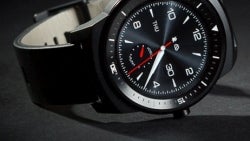Hackers can grab personal data from your smartwatch

A group of "white hat" hackers (wearing white hats means that they are good guys) have tested how secure smartwatches are, and the truth is that the hackers were able to swipe personal information out of the LG G Watch, the Samsung Gear 2 Neo and eight other models. Dr. Frank Breitinger, assistant professor and associate director of the University of New Haven Cyber Forensics Research & Education Group, wanted to see if any of the information inside the timepieces was encrypted. The answer was "No."
Without encryption, data like contacts, emails, messages and even your health and fitness data can be swiped by the bad guys. Later this month, the Doctor's group plans on making a presentation in Toulouse, France. Titled "Watch what you wear: preliminary forensic analysis of smartwatches," the presentation will show how the data inside your smartwatch can be quite a haul for criminals looking to steal personal information.
A recent study tested 10 smartwatches and found that all of them were open to attack thanks to lack of encryption, and authentication that was not secure. The question is whether users would be willing to give up the convenience of having all of this information on their wrist if it means no longer living with the constant threat of someone stealing it,
The Information Technology Industry Council and the Software & Information Industry Association wrote a letter to President Obama explaining that while law enforcement agencies do occasionally need to access unencrypted info from smartphones, smartwatches and tablets, this shouldn't preclude Americans from being able to encrypt certain data to prevent criminals from gaining access to it. In the letter, the two groups said, "We appreciate that, where appropriate, law enforcement has the legitimate need for certain information to combat crime and threats. However, mandating the weakening of encryption or encryption 'work-arounds' is not the way to address this need."
What smartwatch wearers need to know is that their timepiece does store data, and info like credit cards and account numbers can be stolen from your watch just like it can be taken from your phone.
source: WPLG
The Information Technology Industry Council and the Software & Information Industry Association wrote a letter to President Obama explaining that while law enforcement agencies do occasionally need to access unencrypted info from smartphones, smartwatches and tablets, this shouldn't preclude Americans from being able to encrypt certain data to prevent criminals from gaining access to it. In the letter, the two groups said, "We appreciate that, where appropriate, law enforcement has the legitimate need for certain information to combat crime and threats. However, mandating the weakening of encryption or encryption 'work-arounds' is not the way to address this need."
"Smartwatches have only just started to become a part of our lives, but they deliver a new level of functionality that could potentially open the door to new threats to sensitive information and activities. As the adoption of smartwatches accelerates, the platform will become vastly more attractive to those who would abuse that access, making it critical that we take precautions when transmitting personal data or connecting smartwatches into corporate networks."-Jason Schmitt, general manager, HP Security, Fortify
What smartwatch wearers need to know is that their timepiece does store data, and info like credit cards and account numbers can be stolen from your watch just like it can be taken from your phone.
source: WPLG
Follow us on Google News












Things that are NOT allowed:
To help keep our community safe and free from spam, we apply temporary limits to newly created accounts: